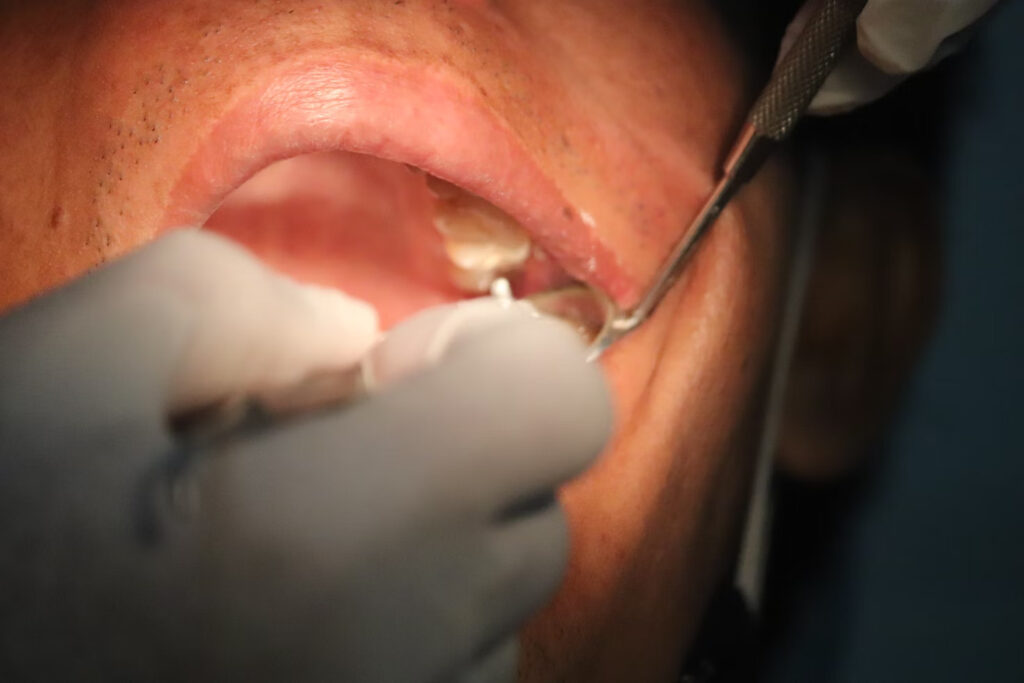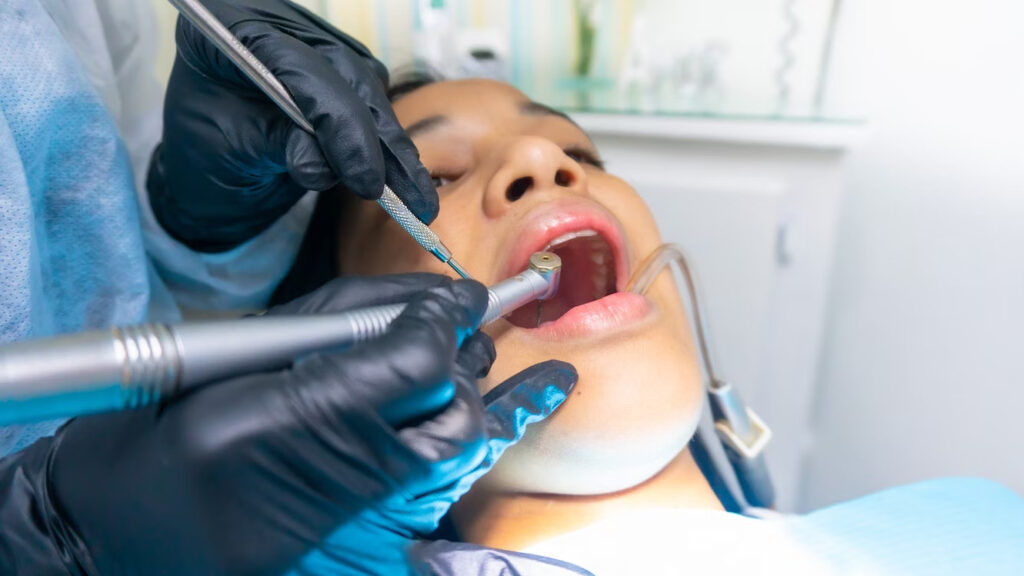


Maintaining good dental health is essential for a beautiful smile and overall well-being. One common dental concern that many people face is the formation of cavities.
Understanding the factors that contribute to the development of cavities and how long it takes for them to form can help individuals take proactive measures to prevent and treat them effectively.
In this article, we will explore the intricacies of cavity formation, stages of decay, influencing factors, prevention, treatment options, and how Belvedere Family Dentistry can help you maintain optimal oral health.
Dental health encompasses the well-being of your teeth, gums, and mouth as a whole. Proper oral hygiene ensures your teeth' longevity and prevents oral diseases. Brushing twice daily, flossing, and having regular dental check-ups are vital components of maintaining good dental health.
Neglecting dental health can lead to various problems such as tooth decay, gum disease, bad breath (halitosis), tooth loss, and oral infections. Additionally, research has indicated a link between oral health and overall systemic health, highlighting the importance of maintaining good dental hygiene practices.
A cavity, also known as dental caries or tooth decay, is a small hole that forms on the hard surface of your tooth. It occurs when the bacteria in your mouth produce acids that attack the tooth enamel, leading to demineralization and decay. If left untreated, cavities can grow larger and affect the deeper layers of the tooth, potentially causing pain, infection, and even tooth loss.

Understanding the stages of cavity formation can shed light on the timeline of how long it takes for a cavity to develop.
The initial stage of cavity formation starts with the accumulation of plaque on the tooth surface. Plaque is a sticky film containing bacteria that feed on sugars from the food we consume. Over time, these bacteria produce acids that erode the tooth enamel, paving the way for cavities to develop.
As plaque buildup persists, the acid produced by the bacteria begins to demineralize the tooth enamel. This process weakens the enamel, making it susceptible to decay.
Initially, this demineralization appears as a white spot on the tooth surface, indicating the early stages of cavity formation.
If left untreated, the demineralization progresses, and the decay reaches the dentin, the layer beneath the enamel. Dentin is softer and more vulnerable to acid erosion, causing the decay to advance more rapidly. At this stage, the cavity becomes visible as a small hole in the tooth.
When the cavity reaches the innermost layer of the tooth, known as the pulp, it can lead to an infection. The pulp contains nerves and blood vessels, and the infection can cause severe pain and discomfort. If the infection spreads, it may require more extensive dental treatments, such as root canals or extractions.
Several factors influence the speed at which cavities form in individuals. Understanding these factors can empower you to take proactive measures to prevent cavity formation.
Maintaining a consistent oral hygiene routine is crucial to preventing cavities. Brushing your teeth at least twice a day with fluoride toothpaste, flossing daily, and using mouthwash can help remove plaque and bacteria, reducing the risk of cavities.
The foods and beverages you consume can significantly impact your dental health. A diet high in sugary and acidic foods promotes bacterial growth and increases the likelihood of cavity formation.
Limiting the intake of sugary snacks and beverages, opting for healthier alternatives, and rinsing your mouth with water after consuming sugary foods help mitigate the risk.
Fluoride is a natural mineral that strengthens tooth enamel and makes it more resistant to acid attacks. Using fluoride toothpaste, drinking fluoridated water, and receiving professional fluoride treatments from your dentist can aid in cavity prevention.
Genetic factors and underlying health conditions can influence susceptibility to cavities. Some individuals may have naturally weaker enamel or lower saliva production, making them more prone to cavity formation.
Additionally, conditions that reduce saliva flow, such as dry mouth, can increase the risk of cavities.

Taking preventive measures and seeking timely treatment is crucial to managing cavities effectively and maintaining optimal dental health.
Preventing cavities is always better than treating them. Adopting good oral hygiene practices and making smart lifestyle choices can significantly reduce the risk of cavity formation and subsequent dental complications.
Investing time and effort in preventive dental care can yield long-term benefits. By preventing cavities, you can avoid costly and invasive dental treatments, maintain natural teeth for a lifetime, and enjoy better oral health.
If a cavity forms, early detection and prompt treatment are essential to prevent further decay and damage. Belvedere Family Dentistry offers various treatment options tailored to the severity and location of the cavity.
A root canal treatment may be necessary for cavities that have reached the inner pulp. The infected pulp is removed during this procedure, and the tooth is sealed to prevent further infection. In cases where the tooth is severely damaged and cannot be saved, extraction may be recommended.
For smaller cavities, dental fillings are often the treatment of choice. The decayed portion of the tooth is removed, and the hole left is filled with durable, tooth-colored material. In cases where the cavity is more extensive, or the tooth structure is compromised, a dental crown may be placed to restore strength and aesthetics.

At Belvedere Family Dentistry, we are dedicated to providing exceptional dental care and helping our patients achieve optimal oral health. Our team of experienced professionals offers a comprehensive range of preventive, restorative, and cosmetic dental services.
With a patient-centered approach, we emphasize preventive care and education to help you understand the best practices for maintaining your dental health.
From regular check-ups to personalized treatment plans, we strive to deliver comfortable and effective dental care that exceeds your expectations.
Cavity formation is a complex process influenced by various factors such as oral hygiene, dietary habits, and genetics.
Understanding the stages of cavity formation, preventive measures, and treatment options can help you maintain optimal dental health. By adopting good oral hygiene practices, making smart lifestyle choices, and seeking professional dental care, you can prevent cavities, preserve your natural teeth, and enjoy a healthy and beautiful smile.
If you're looking for a trusted dental partner to help you prevent and treat cavities, look no further than Belvedere Family Dentistry.
Our experienced team is dedicated to providing personalized and comprehensive dental care that meets your unique needs.
Schedule an appointment with us today and take the first step towards a cavity-free and healthy smile.

Welcome to Belvedere Dentistry, where your smile is our top priority. If you're wondering, "How long does a dental cleaning take?" you've come to the right place.
We understand the importance of your time and oral health, so let's explore the world of dental cleanings together.
Sit back, relax, and get ready to discover the ins and outs of dental cleanings.
A dental cleaning, also known as dental prophylaxis, is a vital procedure performed by dental professionals to maintain your oral health. It involves removing plaque, tartar, and stains from your teeth to keep them healthy and free from dental issues.
You might be wondering why dental cleaning is essential when you already brush and floss your teeth at home. Let's think of it this way: Imagine your mouth as a beautiful garden and plaque and tartar as stubborn weeds trying to invade and wreak havoc.
Regular dental cleanings act as the skilled gardener who ensures your garden stays vibrant, preventing any potential problems from taking root.
Having your teeth professionally cleaned offers many benefits beyond just fresh breath and a sparkling smile. Here are some of the key advantages:
Now that you understand the importance of dental cleanings let's walk through the typical steps involved in this essential procedure.
While the specific process may vary slightly depending on the dental office and individual needs, here's a general outline of what to expect during a dental cleaning:
Before beginning the cleaning, your dental professional may take X-rays of your teeth and jaw. X-rays provide detailed images, allowing them to assess the health of your teeth, roots, and supporting structures.
These images are invaluable in detecting any hidden issues that may require attention.
Scaling eliminates the plaque and tartar buildup on your teeth and along the gumline. Using specialized tools, your dental hygienist skillfully removes stubborn deposits, ensuring a thorough cleaning and leaving your teeth feeling smooth and fresh.
After scaling, it's time to polish those pearly whites! A gritty toothpaste and a high-powered electric brush are used to scrub away surface stains and plaque gently. This polishing step not only enhances the appearance of your teeth but also helps prevent future stains from sticking easily.
Flossing is an essential part of any dental cleaning. Your dental professional will expertly floss between each tooth, reaching areas your toothbrush cannot access. This removes any remaining plaque or debris, ensuring your teeth and gums are thoroughly clean.
In some cases, your dental professional may recommend a fluoride treatment after the cleaning. Fluoride is a mineral that helps strengthen your tooth enamel and protect against tooth decay. It's like giving your teeth an extra shield of defense, keeping them strong and healthy.

While dental cleanings are typically efficient and timely, there are instances where they may take longer than usual. Let's explore some reasons for extended cleaning durations:
If it's been a while since your last dental cleaning or if you struggle with plaque buildup, the cleaning process may require additional time. Your dental professional will take the necessary measures to remove all plaque, leaving your teeth in optimal condition.
If you have gum disease or other periodontal issues, a dental cleaning may take longer due to the need for specialized treatment.
Deep cleaning techniques, such as root planing and scaling below the gum line, may be required to address gum disease properly. These meticulous procedures ensure the health of your gums but may extend the overall cleaning time.
Sometimes, during a routine dental cleaning, your dental professional may discover additional dental concerns that require attention.
This can include cavities, broken fillings, or other dental work. Treating these issues may lengthen the cleaning time, as the dental professional ensures that your teeth receive comprehensive care.
Regular dental cleanings are key to maintaining optimal oral health. The recommended frequency for dental cleanings is typically every six months. However, this can vary depending on individual circumstances. Your dentist will assess your specific needs and advise you on the appropriate interval for your dental cleanings.
At Belvedere Dentistry, we understand the importance of a healthy and beautiful smile. When you choose us for your dental cleaning, you can expect the following:
If you're ready to experience a dental cleaning that refreshes your smile and rejuvenates you, schedule an appointment with Belvedere Dentistry today!
Now, let's address some common questions about dental cleanings:
The duration of a dental cleaning can vary depending on various factors, including the individual's oral health, the extent of plaque and tartar buildup, and any additional treatments required. Routine dental cleaning can take anywhere from 30 minutes to an hour.
Dental cleanings are typically not painful. You may experience some mild discomfort or sensitivity during certain parts of the cleaning, such as when removing plaque or polishing the teeth.
However, your dental professional will ensure your comfort throughout the process.
It is generally recommended to have a dental cleaning every six months. However, the frequency may vary depending on your oral health and specific needs.
Your dentist will evaluate your individual situation and advise you on the ideal interval for your cleanings. Regular check-ups and cleanings play a crucial role in maintaining optimal oral health.

Congratulations! You now understand how long dental cleanings take and their significance in maintaining optimal oral health.
Regular dental cleanings at Belvedere Dentistry keep your teeth clean and contribute to overall well-being.
Our team of dedicated dental professionals is committed to providing exceptional dental care in a warm and welcoming environment.
We prioritize your comfort and tailor our services to meet your unique needs. Schedule your dental cleaning with Belvedere Dentistry today and take the first step toward a healthier, more confident smile.
Imagine it’s still winter … you’re standing at the door, ready to brave the cold. You’re layered-up with three shirts and a sweatshirt, your heavy winter coat, and two layers of socks underneath your waterproof winter boots. Then you’ve got those awesome jeans with the flannel on the inside, your comfy hat, scarf, and gloves. You’re set! But wait. As you step toward the door, you suddenly realize you have an itch … and it’s deep down … buried beneath all those layers. And, try as you may, every attempt to reach that bugger-of-an-itch fails. Defeated, you realize the only relief you’re ever gonna’ get is to remove each one of those layers. Where are we going with this?!
We’re going inside your mouth, of course, to your tongue – this is a dental article, after all! Because whether you know it or not, like you in the wintertime, your tongue is also “all covered up” – buried beneath layers of bacteria, fungi, and food residue that can inhibit your ability to taste, let alone cause your tongue to appear various shades of yellow, white, or green! Remove the bacteria, though, and your food will once again directly interact with those taste buds, and return to its natural hue. So how does one do that? With a tongue scraper, of course!
A tongue scraper is a U-shaped device designed to “scrape” the top layer of scum from your tongue. They have been in use since ancient times, and have been made of everything from wood to whalebone. Nowadays, they are made of more hygienic material, and come in a variety of shapes, sizes, designs and colors.
The residue on your tongue includes things like the cavity-inducing Streptococcus mutans bacterium, fungi, rotting food (that’s not good), and what’s referred to as “volatile sulfur compounds.” In other words, sulfur – that “rotting egg smell.” Talk about ew! So, as you can see, there are several reasons why you’d want to get rid of this gunk in your mouth. Let’s tackle them one by one:
In general, make sure to rinse your tongue scraper before and after use. Apply the tongue scraper to the back of your tongue and drag it forward. Then, rinse and repeat. Make sure to get the sides of your tongue as well, not just the center! Make sure not to press too hard or you can cause yourself to bleed. And, if you’re wondering if you should scrape your tongue while recovering from a dental procedure, that’s a good question … ask your dentist for the best advice particular to your situation. Still not sure how this thing really works? The next time you’re in ask Dr. Bansch for a quick tutorial!
Tongue scrapers are relatively inexpensive, and can be found at any local drugstore. It doesn’t matter the material, color, or brand – just find the one you like and get scraping!
It’s National Heart Health Month! Did you know that oral health can be directly linked to heart health? Delta Dental has recently provided evidence that gum disease in both moderate and advanced stages puts you at a greater risk for developing heart disease than you be with healthy gums. Regular oral screenings can also help point doctors to a variety of other diseases that may start with warning signs in your mouth.
Every system in your body is connected. Just like consuming food through your mouth makes its way to your stomach, any bacteria or germs that start off in your mouth can fairly easily be spread throughout the rest of your body through your blood stream.Mayo Clinic and theAmerican Heart Association have been able to show that this bacteria can actually attach itself to any already damaged areas when it gets to your heart. The attached bacteria can then lead to further inflammation, which has been linked to clogged arteries and even strokes.
People who suffer from chronic gum diseases like gingivitis or advanced periodontitis are at the highest risk for developing heart disease as a direct cause of poor oral health and dental hygiene. It is important to know that plaque buildup from skipping just one brushing or flossing session a week can easily add up to create issues with your gums.
Keeping up with your regular cleanings and examinations here at Belvedere Family Dentistry & Orthodontics is extremely important in protecting yourself against harmful bacteria and diseases. Call our front desk today at 704-927-5499 to schedule your next appointment with us! If you have any concerns surrounding your oral health, and gum diseases especially, be sure to talk to one of our dentist and explain all of your symptoms.
Read this article by Tracey Sandilands, published for Colgate, to learn more about how your heart and mouth are related and what you should do to prevent disease from growing.
Taking vitamins everyday can help with a number of issues that people have on a daily basis. When the vitamins are not taken, it can become apparent due to the nutrients that are holding them back since the body does not have any. The professionals here at Belvedere Family Dentistry know how important having the right vitamins can be to your oral health. Improve your oral health with the use of these high rated vitamins that will improve and strengthen your smile.
 A lot of these vitamins are not surprising to many patients. They know their body should have them, but sometimes the food and drinks we consume are not enough to keep up on oral health. This is why a multi-vitamin that has these items is oftentimes recommended, especially when the body doesn’t absorb nutrients very well.
A lot of these vitamins are not surprising to many patients. They know their body should have them, but sometimes the food and drinks we consume are not enough to keep up on oral health. This is why a multi-vitamin that has these items is oftentimes recommended, especially when the body doesn’t absorb nutrients very well.
Speak with our dentists here at Belvedere Family Dentistry, the best dentist in Charlotte, North Carolina, to find out how we can help your oral hygiene and health along. You want to have that perfect, bright smile. Now we are here to provide the help needed to achieve it. Make sure you’re covered each and every time you smile.
Oral hygiene/dental hygiene means the overall maintenance of the mouth, gums and teeth. It includes daily maintenance at home as well as regular dental checkups and professional teeth-cleaning treatments. Just as it is important for you to brush and floss your teeth regularly, it is equally important that you get professional cleanings done from your dentist/dental hygienist. This is the best way of keeping your natural teeth for years to come.
The Oral Hygiene Process
Regardless of how religiously and meticulously you brush & floss every day, over time there will be a build-up of calculus on the teeth. As this calculus builds under the gum line, bacteria begin invading the area and can lead to a range of dental problems. Your dental hygienist will ensure that this calculus build-up is eliminated. This helps in maintaining optimum oral health.
Maintaining Oral Health
Dental hygienists are experts at scraping away all the hard plaque & in removing calculus deposits. They take x-rays for your dentist and the latter will check thoroughly for dental decay, tumors, cysts or changes in the bone-support of the teeth.
Once the hygienist has finished cleaning the teeth, your dentist will then examine your gums and teeth for any signs of gum disease or tooth decay. The American Dental Association recommends that patients should visit the dentist & dental hygienist 2 times every year. This goes a long way in promoting good oral health.
Unsightly dental work performed in the past can hinder a person’s confidence and make them self-conscious about their appearance. Bad dental work also results in poor occlusion, improper mastication, infections and tooth loss. Our Charlotte dentists offer several methods of improving a patient’s smile and facial esthetics through specialized cosmetic dentistry solutions as noted below:
Tooth-colored Fillings
Existing amalgam or silver fillings can be replaced by tooth-colored materials. Although durable, the silver fillings darken and fracture over time leaving gaps between the tooth structure and the restorations. Plaque and bacteria accumulate in the pits and fissures of the tooth leading to infections and pain. Most amalgam restorations can be replaced with a sturdy composite material that matches the natural pigmentation of the dentition.
Porcelain Laminate Veneers
Permanent discoloration of anterior (frontal) teeth can be corrected with the application of veneers. This method of improving the patient’s smile is a great alternative to more invasive procedures, such as crown placement. The veneers are typically recommended by Charlotte dentists for patients with severely discolored teeth or multiple diastemas. Medically compromised patients are not good candidates for this procedure. Cosmetic dentistry services are focused on correcting any existing dental issues without compromising the function or facial esthetics.
Crowns and Bridges
Excessive tooth structure loss and root canal treatments often require the application of crowns and bridges. Bad dental work can also be corrected by this technique and provide the patient with a beautiful smile. Our Charlotte dentists will carefully inspect the health status of each tooth and determine if the patient can benefit from this procedure using CEREC technology to accomplish a successful treatment with only 1 visit to our office. The color and the shape of the crowns are perfectly matched to complement any existing dentition.
Removable Prosthetics/Dentures
In cases where a crown or a veneer may be out of your budget, you may want to consider the benefits of partials and dentures. Non-metal prosthetics can be manufactured replacing missing teeth and improving the patient’s smile and oral functions at a more affordable rate. Our cosmetic dentistry services offer these dental appliances by using the highest quality materials at discounted prices.
If you have any questions or would like more information about our cosmetic dentistry treatments, please feel free to contact our Charlotte dentist office at 704-927-5499 or by using our convenient online appointment request form.
Sitting around the table with family and friends while eating a plate of delicious, traditional Thanksgiving food is something the we look forward to all year long. Unfortunately, some of those foods are extremely harmful to your teeth. Swap out a few of the worst Thanksgiving foods and your teeth will be thankful.
Turkey Bones
If you enjoy eating the turkey leg, be aware of scraping your teeth against the bone. The hard bone can chip and break teeth, making a trip to the general dentist necessary. Never attempt to bite the meat off of the bone with your back molars, as this can cause fillings or crowns to become loose. Instead of eating meat off of the bone, try cutting it off first and then eating it with a fork.
Pecan Pie
This tempting dessert has 31 grams of sugar per slice, not including the amount of sugar in the whipped cream or ice cream that is often served alongside it. Sugar is used by plaque as energy; when too much sugar is eaten, tooth decay and cavities may result. In addition to the high sugar content, the pecans themselves pose a risk to teeth as they can become wedged in-between teeth and require help for removal from your local dentist office. Try eating a slice of pumpkin pie instead and skip the creamy sides.
Dried Fruits
Apricots, prunes and raisins often appear in a nut-and-fruit tray served as a Thanksgiving appetizer. Though many people believe that dried fruits are a healthier option, their concentrated sugar content makes teeth susceptible to decay. Chewy or sticky foods, such as dried fruits, also stay on the teeth longer and are more difficult to remove without proper teeth cleaning. Look for fresh fruits, vegetables or soft cheeses to snack on instead while waiting for the big meal.
Alcohol
Many people enjoy a glass of wine with their Thanksgiving dinner. Unfortunately, the high acid content in alcohol erodes the teeth over time. Alcohol also dehydrates the mouth, removing saliva that works to wash and protect the teeth. Additionally, red wine also harms the teeth because the dark tint may stain your pearly whites over time. Always drink a glass of water after drinking alcohol in order to rinse your mouth and decrease your risk of dehydration.
Contact your general dentist at your local dentist office today. The friendly and professional dentists and staff are experts in teeth cleaning after indulging during the Thanksgiving holiday.
A general dentist provides a basic amount of restorative and preventative treatments to a patient’s teeth. These procedures can repair damage caused by decay, prevent infections and other issues that can cause bone atrophy, or prevent issues.
How Can a General Dentist Help to Prevent Dental Problems?
There are a number of ways that a dentist can help to prevent problems in the mouth. These include things from dental exams to more complicated procedures involving cleaning below the gum line.
Some of the preventative treatments general dentists tend to offer include:
Preventative care from a dentist tends to help reduce the number of restorative treatments that a patient may require. They can also prevent irreversible conditions, such as advanced periodontitis, from occurring.
What Restorative Procedures Do Dentists Perform?
Restorative procedures are designed to restore the function and form of your teeth. These procedures are generally conducted within your local dentist office. Most are completed within one to two appointments.
Some examples of restorative procedures your dentist may perform are:
Keeping Your Smile Healthy
The procedures listed above are just a few examples of the procedures that can stabilize and restore your mouth’s health.
When you’re ready to rejuvenate your smile, then call our local dentist office. We can schedule an appointment for exams and a consultation to ensure your is functional and beautiful.
What is a Pediatric Dentist?
A pediatric dentist is trained in the care of children’s oral health. They typically treat children who are infants through the teenage years. Children normally begin to get teeth when they are six months old. Between the ages of six and seven, many children begin to lose their first set of teeth and grow in a second set that is permanent. A pediatric dentist has special qualifications in caring for children’s teeth, gums and mouth throughout all of these stages.
A pediatric dentist must complete:
Additionally, many pediatric dentists receive additional training in treating children with special needs, such as autism, anxiety or hyperactivity.
What Treatments are Typically Done by a Pediatric Dentist?
A children’s dentist can provide:
At What Age Should My Child See a Pediatric Dentist?
Proper dental hygiene for children is a growing concern with tooth decay being five times more common in children than asthma and seven times more common than hay fever. Tooth decay can cause infections, pain and problems with proper tooth alignment.
Because of this, it is important to schedule regular visits with a children’s dentist. The American Dental Association recommends that a child’s first visit to the dentist occur as soon as their teeth being to grow in, between six and 12 months of age. An appointment from the local dentist office should be requested as soon as teeth begin to appear.
What Can I Expect from a First Appointment?
During the first visit, a child’s teeth, gums and mouth will be thoroughly examined. This exam may include taking x-rays. The child’s teeth will then be cleaned and a fluoride treatment may be applied to the teeth. The dentist can teach parents the best ways to clean the child’s teeth, remove plaque, give dental hygiene tips and answer any questions that parents may have about their child’s oral health.
A pediatric dentist will be able to provide specialized care for children of all ages. The local dentist office will be able to recommend a pediatric dentist that will give individual care for whatever the child may need.
Uptown Charlotte Dentistry & Orthodontics
We do our best to make it easy for you to get the beautiful smile you deserve! Our office accepts nearly all major insurance plans. Even though dental insurance is a private arrangement between you and your company, we will file your claim, handle all the paperwork, and help you get maximum insurance benefits.
Follow us
Don't Miss Out On Dental Tips or
Special Discounts.
